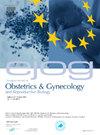Validation and psychometric analysis of the Spanish version of the menstrual attitude questionnaire
IF 2.1
4区 医学
Q2 OBSTETRICS & GYNECOLOGY
European journal of obstetrics, gynecology, and reproductive biology
Pub Date : 2025-02-11
DOI:10.1016/j.ejogrb.2025.02.023
引用次数: 0
Abstract
Problem
In Spanish, there is no instrument available to assess the symptoms associated with the menstrual cycle.
Background
The evaluation of menstrual attitudes is clinically important, particularly for women who experience discomfort or pain during their menstrual cycle.
Aim
To validate and analyse the psychometric properties of the Menstrual Attitude Questionnaire (MAQ) in a Spanish population.
Methods
Adaptation and translation of the MAQ into Spanish, and cross-validation with data collected between March 2023 and March 2024 from 800 women (age 18–57 years).
Findings
The first factor analysis showed that six items did not load on any factor, so they were excluded from the analysis (Items 9, 17, 18, 24, 28 and 29). Once these items had been eliminated, the exploratory factor analysis showed that four factors could be extracted: performance, positivity, anticipation and subjectivity.
Discussion
Statistical analysis revealed that the proposed Spanish version of the MAQ consists of four factors. This implies a reduction of one factor compared with the original MAQ, resulting from the merging of two sections: ’Menstruation as an annoying event’ and ’Menstruation as a natural event’. Both components of the questionnaire refer to the ’identity’ or meaning that women attribute to their menstruation.
Conclusions
The Spanish version of the MAQ consists of four factors and 29 items, explaining most of the variability in the data. The Spanish version of the MAQ demonstrates good internal consistency and, therefore, represents a valuable tool for healthcare professionals who work daily with women with menstrual symptoms.
求助全文
约1分钟内获得全文
求助全文
来源期刊
CiteScore
4.60
自引率
3.80%
发文量
898
审稿时长
8.3 weeks
期刊介绍:
The European Journal of Obstetrics & Gynecology and Reproductive Biology is the leading general clinical journal covering the continent. It publishes peer reviewed original research articles, as well as a wide range of news, book reviews, biographical, historical and educational articles and a lively correspondence section. Fields covered include obstetrics, prenatal diagnosis, maternal-fetal medicine, perinatology, general gynecology, gynecologic oncology, uro-gynecology, reproductive medicine, infertility, reproductive endocrinology, sexual medicine and reproductive ethics. The European Journal of Obstetrics & Gynecology and Reproductive Biology provides a forum for scientific and clinical professional communication in obstetrics and gynecology throughout Europe and the world.

 求助内容:
求助内容: 应助结果提醒方式:
应助结果提醒方式:


